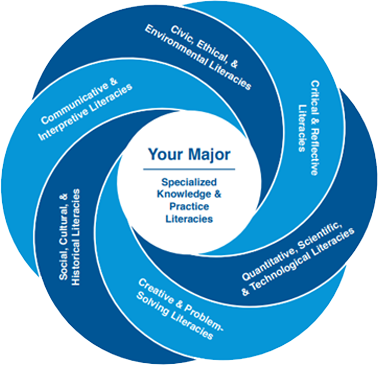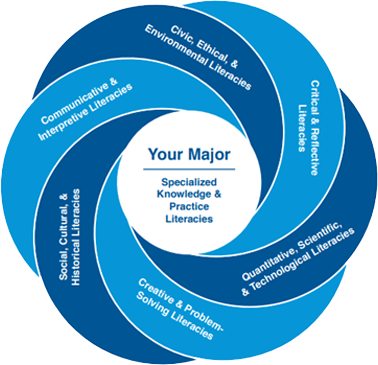Purpose of the GURs
The GURs, the core of a liberal arts and sciences education, provide students with foundational knowledge and opportunities to develop, integrate, and extend their core capacities in a range of literacies.
The term literacy, by definition, includes both knowledge and ways of knowing and practice and ways of doing which makes literacies an ideal choice for describing the purpose of Western’s GUR program. The six knowledge and practice literacies clusters described below are not distinct or rigid categories with firm boundaries. They are interconnected parts of a whole. Grouping broad disciplinary areas or interests into one of three multi-dimensional knowledge literacies clusters works against the common misconception that the GURs are simply a distribution list of separate items that students need to complete and check off.

Students can use the literacy practices that they are acquiring to forge their own connections and linkages within and between these domains. Ideally, students come to see the GURs as clusters of ideas, methodologies, and practices that can help them continue to build understandings of themselves and their worlds throughout their lives.
An individual GUR course does not have to address all the literacies in the cluster title. For example, a course in the Social, Cultural, & Historical Literacies cluster might focus more on cultural literacies or social literacies. Some courses might have a historical component, and others might not. A course in the Quantitative, Scientific, & Technological Literacies cluster, may focus on quantitative literacies, scientific literacies, or some combination of these literacies. An Environmental Studies GIS course might focus on science and technology, for instance.
Core Knowledge Literacies Clusters
Courses in the three knowledge clusters include courses from multiple disciplines that develop and extend content knowledge in three broad areas:
Social, Cultural & Historical Literacies
Typically, courses from the HUM and SSC GURs. This cluster also includes many ACGM and BCGM courses. Courses in this cluster focus on the foundational knowledge and aesthetic, theoretical, and methodological approaches for studying the diversity of human experience.
Civic, Ethical, & Environmental Literacies
Typically, courses from SSC, SCI, as well as some HUM GURs. This cluster also includes many ACGM and BCGM courses. Courses in this cluster focus on knowledge of humans, their value systems, their organizations and contexts, and/or their place in the natural environment.
Quantitative, Scientific, & Technological Literacies
Typically, courses from the QSR, SCI, and SSC GURs. Courses in this cluster focus on quantitative and symbolic reasoning and theoretical, methodological, experimental, and technological approaches for studying the physical and biological world.
Core Practices Literacies Clusters
Together, all GUR courses work to develop and extend students’ core capacities in a range of practices. The amount of time different courses spend on helping students acquire different literacy practices will vary, and some GUR courses will focus more deliberately on specific literacy practices than others. For example, many COM courses focus explicitly on helping students learn and acquire different kinds of communicative and interpretive practices. COM courses are also likely to focus on one or more of the other practices clusters.
Communicative & Interpretive Literacies
These literacy practices focus on reading, interpreting, and communicating information through oral, print, & digital media and genres for audiences, both specialized and general.
Creative & Problem-Solving Literacies
These literacy practices focus on methods for solving complex problems, generating and designing innovative ideas, and creating aesthetically engaging works.
Critical & Reflective Literacies
These literacy practices include evaluating and contextualizing sources and information, applying various theoretical frameworks to examine and/ or evaluate texts, knowledge, and truth claims, and identifying and examining one’s own (and other’s) assumptions, values, and beliefs.

GUR rosette download options
The knowledge and literacies rosette image is required to be included in all GUR syllabus.
Select one of the download options, then right click on the image and select "save as" to save an image. The PowerPoint file will automatically download.
